Unit 5 What were you doing when the rainstorm came?知识点总结与练习学案(含答案解析) 人教版英语八年级下册
文档属性
| 名称 | Unit 5 What were you doing when the rainstorm came?知识点总结与练习学案(含答案解析) 人教版英语八年级下册 |
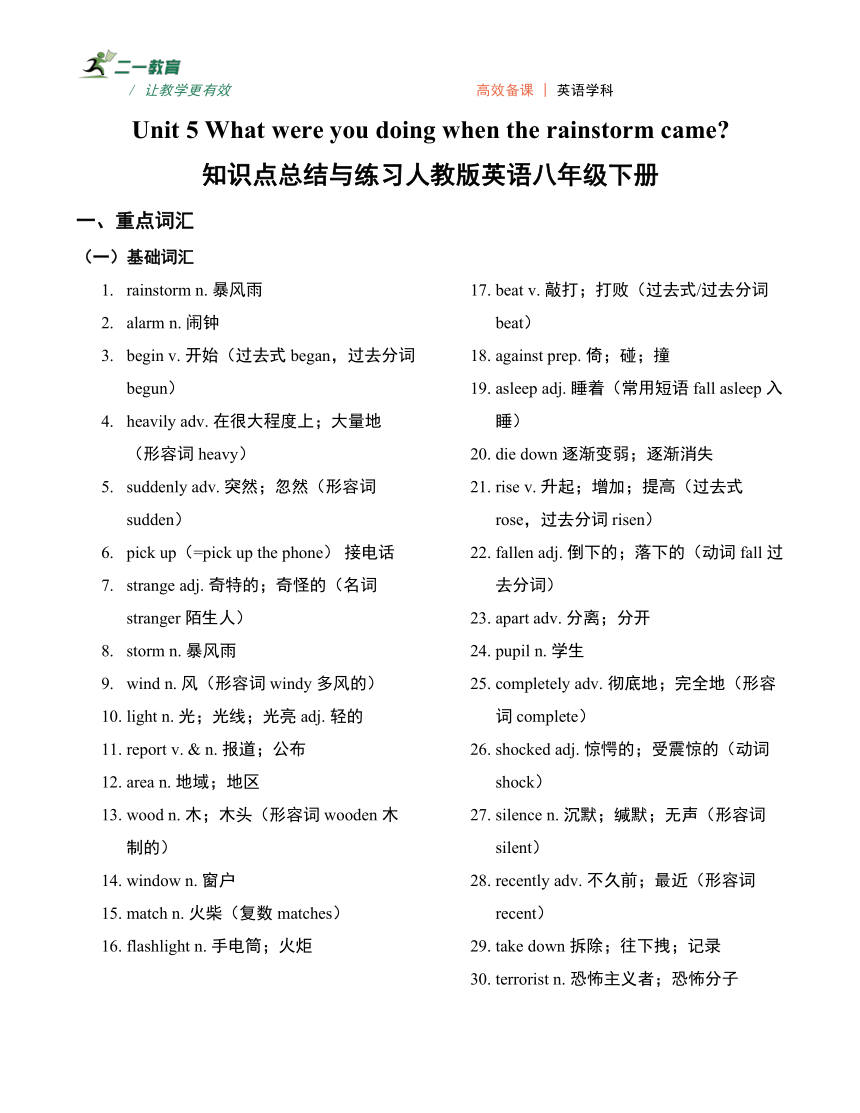
|
|
| 格式 | docx | ||
| 文件大小 | 43.6KB | ||
| 资源类型 | 试卷 | ||
| 版本资源 | 人教新目标(Go for it)版 | ||
| 科目 | 英语 | ||
| 更新时间 | 2025-05-16 00:00:00 | ||
图片预览

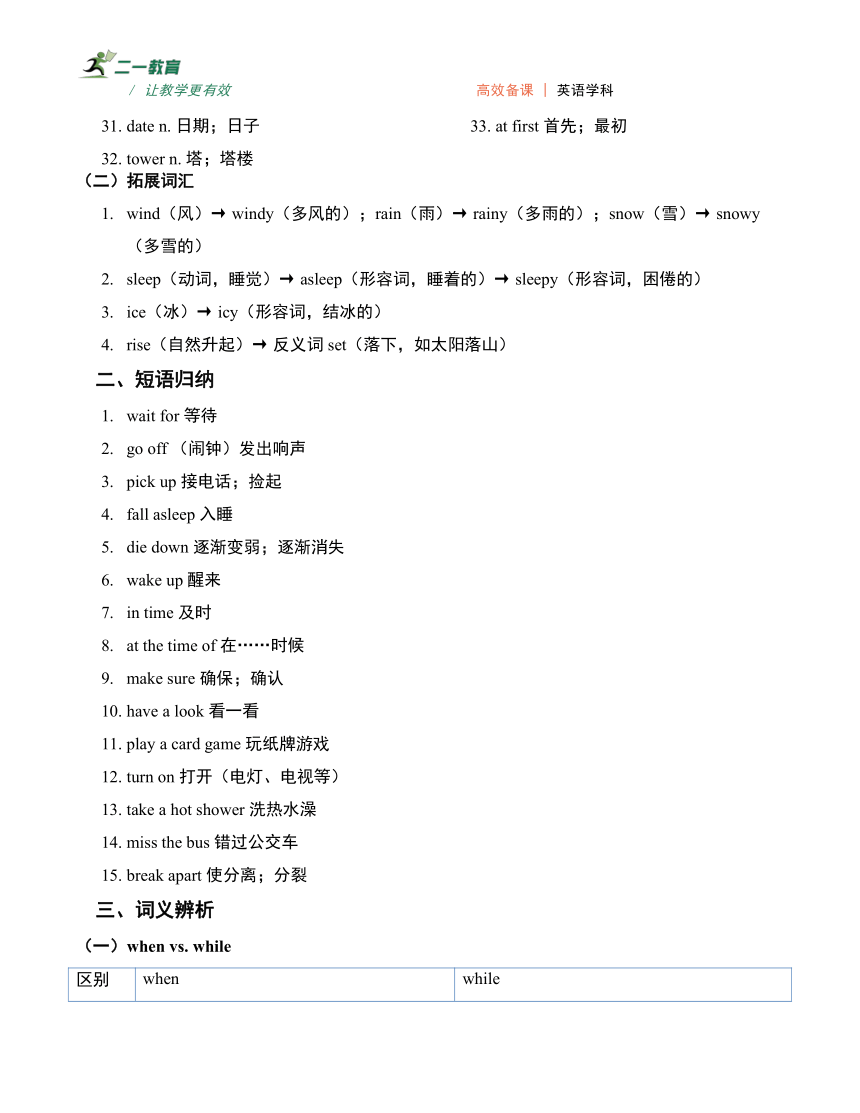
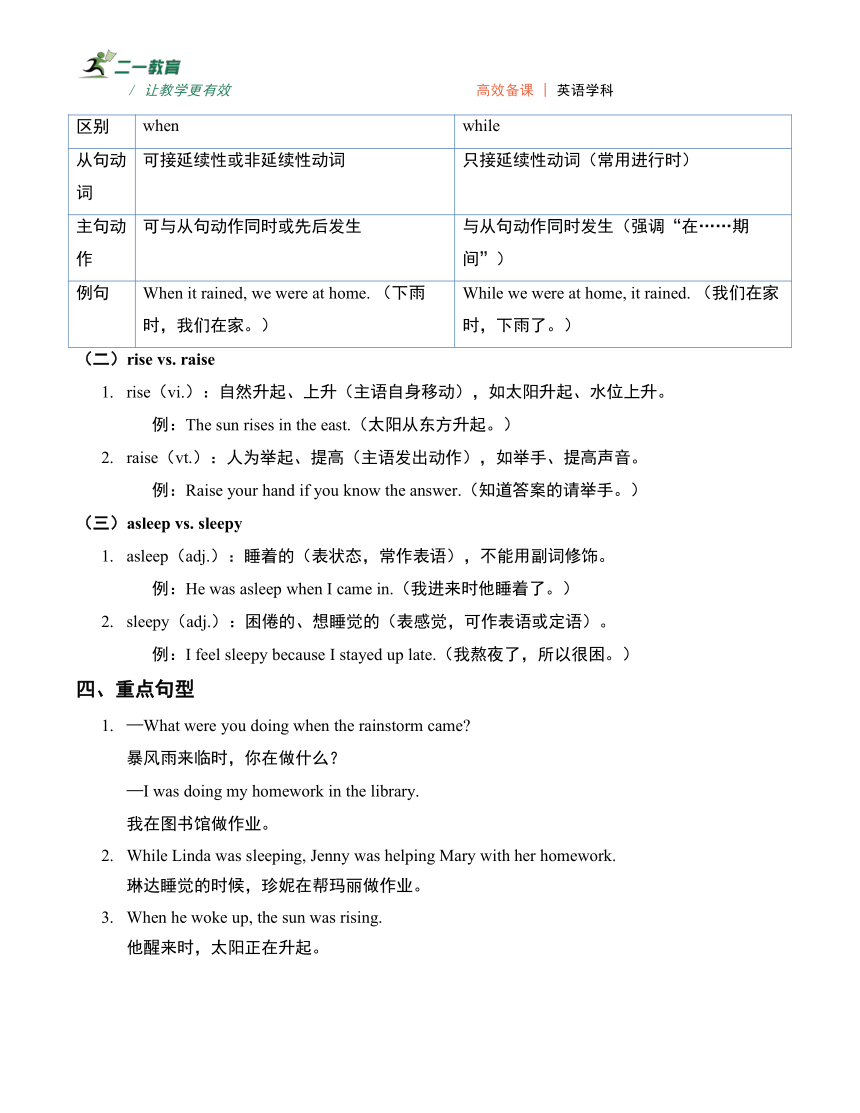
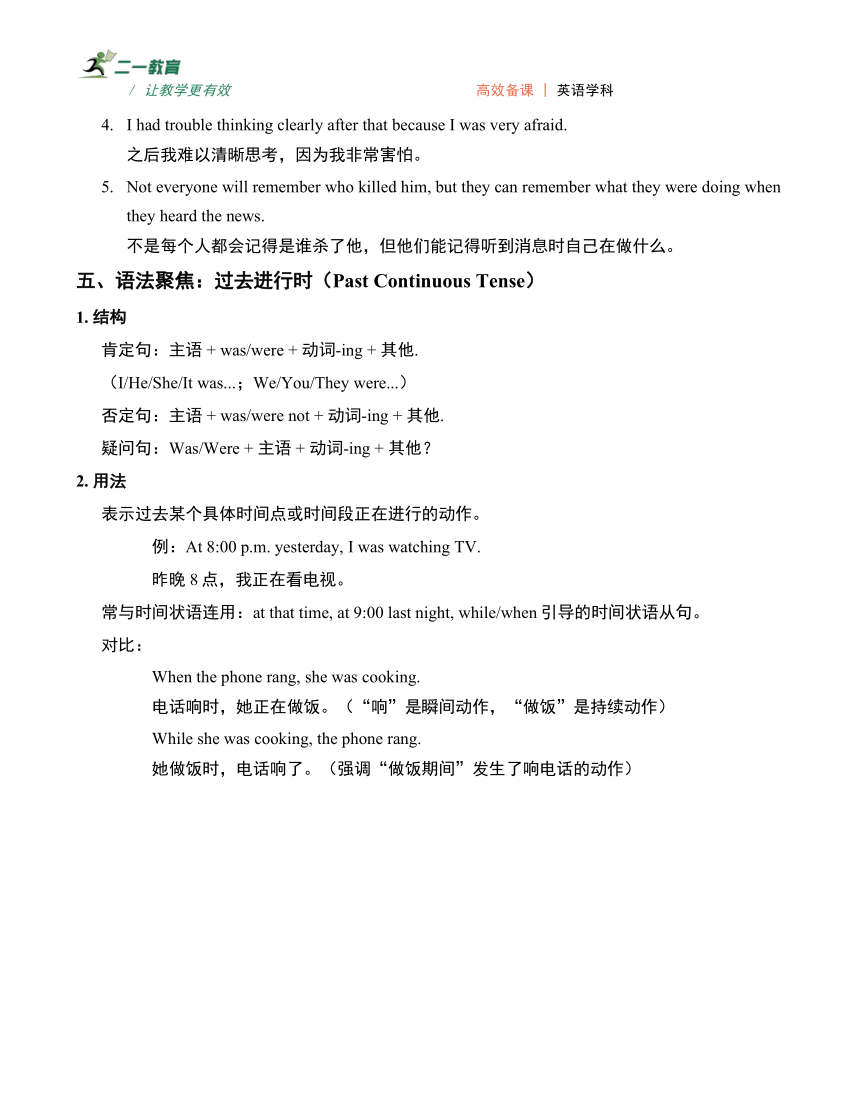
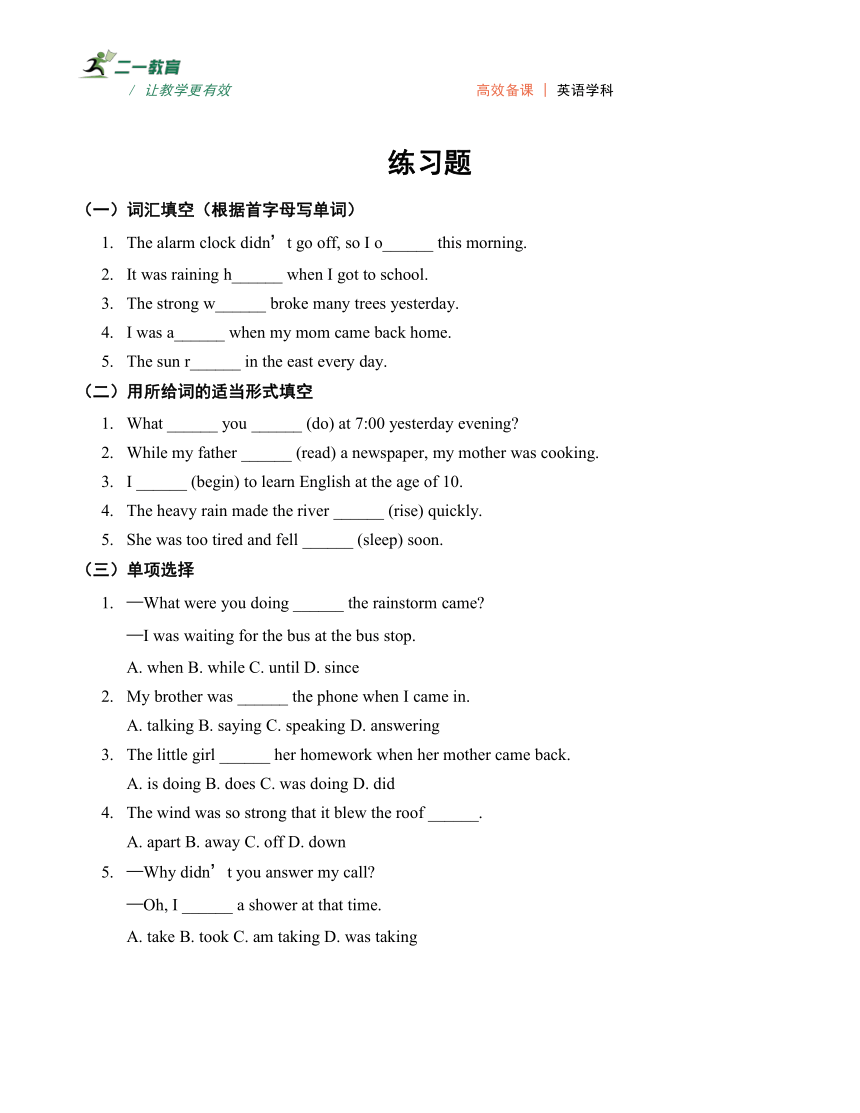
文档简介
Unit 5 What were you doing when the rainstorm came
知识点总结与练习人教版英语八年级下册
一、重点词汇
(一)基础词汇
/ 让教学更有效 高效备课 | 英语学科
rainstorm n. 暴风雨
alarm n. 闹钟
begin v. 开始(过去式 began,过去分词 begun)
heavily adv. 在很大程度上;大量地(形容词 heavy)
suddenly adv. 突然;忽然(形容词 sudden)
pick up(=pick up the phone) 接电话
strange adj. 奇特的;奇怪的(名词 stranger 陌生人)
storm n. 暴风雨
wind n. 风(形容词 windy 多风的)
light n. 光;光线;光亮 adj. 轻的
report v. & n. 报道;公布
area n. 地域;地区
wood n. 木;木头(形容词 wooden 木制的)
window n. 窗户
match n. 火柴(复数 matches)
flashlight n. 手电筒;火炬
beat v. 敲打;打败(过去式/过去分词 beat)
against prep. 倚;碰;撞
asleep adj. 睡着(常用短语 fall asleep 入睡)
die down 逐渐变弱;逐渐消失
rise v. 升起;增加;提高(过去式 rose,过去分词 risen)
fallen adj. 倒下的;落下的(动词 fall 过去分词)
apart adv. 分离;分开
pupil n. 学生
completely adv. 彻底地;完全地(形容词 complete)
shocked adj. 惊愕的;受震惊的(动词 shock)
silence n. 沉默;缄默;无声(形容词 silent)
recently adv. 不久前;最近(形容词 recent)
take down 拆除;往下拽;记录
terrorist n. 恐怖主义者;恐怖分子
date n. 日期;日子
tower n. 塔;塔楼
at first 首先;最初
(二)拓展词汇
wind(风)→ windy(多风的);rain(雨)→ rainy(多雨的);snow(雪)→ snowy(多雪的)
sleep(动词,睡觉)→ asleep(形容词,睡着的)→ sleepy(形容词,困倦的)
ice(冰)→ icy(形容词,结冰的)
rise(自然升起)→ 反义词 set(落下,如太阳落山)
二、短语归纳
wait for 等待
go off (闹钟)发出响声
pick up 接电话;捡起
fall asleep 入睡
die down 逐渐变弱;逐渐消失
wake up 醒来
in time 及时
at the time of 在……时候
make sure 确保;确认
have a look 看一看
play a card game 玩纸牌游戏
turn on 打开(电灯、电视等)
take a hot shower 洗热水澡
miss the bus 错过公交车
break apart 使分离;分裂
三、词义辨析
(一)when vs. while
区别 when while
从句动词 可接延续性或非延续性动词 只接延续性动词(常用进行时)
主句动作 可与从句动作同时或先后发生 与从句动作同时发生(强调“在……期间”)
例句 When it rained, we were at home. (下雨时,我们在家。) While we were at home, it rained. (我们在家时,下雨了。)
(二)rise vs. raise
rise(vi.):自然升起、上升(主语自身移动),如太阳升起、水位上升。
例:The sun rises in the east.(太阳从东方升起。)
raise(vt.):人为举起、提高(主语发出动作),如举手、提高声音。
例:Raise your hand if you know the answer.(知道答案的请举手。)
(三)asleep vs. sleepy
asleep(adj.):睡着的(表状态,常作表语),不能用副词修饰。
例:He was asleep when I came in.(我进来时他睡着了。)
sleepy(adj.):困倦的、想睡觉的(表感觉,可作表语或定语)。
例:I feel sleepy because I stayed up late.(我熬夜了,所以很困。)
四、重点句型
—What were you doing when the rainstorm came
暴风雨来临时,你在做什么?
—I was doing my homework in the library.
我在图书馆做作业。
While Linda was sleeping, Jenny was helping Mary with her homework.
琳达睡觉的时候,珍妮在帮玛丽做作业。
When he woke up, the sun was rising.
他醒来时,太阳正在升起。
I had trouble thinking clearly after that because I was very afraid.
之后我难以清晰思考,因为我非常害怕。
Not everyone will remember who killed him, but they can remember what they were doing when they heard the news.
不是每个人都会记得是谁杀了他,但他们能记得听到消息时自己在做什么。
五、语法聚焦:过去进行时(Past Continuous Tense)
1. 结构
肯定句:主语 + was/were + 动词-ing + 其他.
(I/He/She/It was...;We/You/They were...)
否定句:主语 + was/were not + 动词-ing + 其他.
疑问句:Was/Were + 主语 + 动词-ing + 其他?
2. 用法
表示过去某个具体时间点或时间段正在进行的动作。
例:At 8:00 p.m. yesterday, I was watching TV.
昨晚8点,我正在看电视。
常与时间状语连用:at that time, at 9:00 last night, while/when引导的时间状语从句。
对比:
When the phone rang, she was cooking.
电话响时,她正在做饭。(“响”是瞬间动作,“做饭”是持续动作)
While she was cooking, the phone rang.
她做饭时,电话响了。(强调“做饭期间”发生了响电话的动作)
练习题
(一)词汇填空(根据首字母写单词)
The alarm clock didn’t go off, so I o______ this morning.
It was raining h______ when I got to school.
The strong w______ broke many trees yesterday.
I was a______ when my mom came back home.
The sun r______ in the east every day.
(二)用所给词的适当形式填空
What ______ you ______ (do) at 7:00 yesterday evening
While my father ______ (read) a newspaper, my mother was cooking.
I ______ (begin) to learn English at the age of 10.
The heavy rain made the river ______ (rise) quickly.
She was too tired and fell ______ (sleep) soon.
(三)单项选择
—What were you doing ______ the rainstorm came
—I was waiting for the bus at the bus stop.
A. when B. while C. until D. since
My brother was ______ the phone when I came in.
A. talking B. saying C. speaking D. answering
The little girl ______ her homework when her mother came back.
A. is doing B. does C. was doing D. did
The wind was so strong that it blew the roof ______.
A. apart B. away C. off D. down
—Why didn’t you answer my call
—Oh, I ______ a shower at that time.
A. take B. took C. am taking D. was taking
(四)句型转换
I was watching TV at 8:00 last night.(改为一般疑问句)
______ ______ watching TV at 8:00 last night
She was doing her homework when the rainstorm started.(对划线部分提问)
______ ______ she ______ when the rainstorm started
While they were playing basketball, it began to rain.(改为同义句)
They ______ ______ basketball ______ it began to rain.
The storm broke many trees.(改为被动语态)
Many trees ______ ______ by the storm.
He was too scared to think clearly.(改为同义句)
He was ______ scared ______ he couldn’t think clearly.
(五)阅读理解
One of the most famous storms in American history was the “Storm of the Century” in 1993. It began on March 12 and lasted for three days. The storm brought heavy snow, strong winds, and huge waves to the East Coast of the US. Many people were trapped (困住) in their homes or cars. Some even had to stay in hotels for days. The storm caused over 300 deaths and billions of dollars in damage (损失).
But for some people, the storm was also a chance to help others. In Virginia, a group of volunteers worked together to save animals from a flooded (被淹没的) farm. In North Carolina, neighbors shared food and water when the power went out. These stories show that even in the worst situations, people can come together and help each other.
How long did the “Storm of the Century” last
A. One day. B. Two days. C. Three days. D. Four days.
What did the storm bring to the East Coast
A. Heavy rain and heat. B. Snow, winds, and waves.
C. Floods and earthquakes. D. Thunder and lightning.
Why did some people stay in hotels during the storm
A. They wanted to have a vacation.
B. Their homes were flooded.
C. They were trapped and couldn’t go home.
D. Their hotels were free.
What is the main idea of the second paragraph
A. The storm caused a lot of damage.
B. Volunteers saved animals during the storm.
C. People helped each other during the storm.
D. Neighbors shared food and water.
(六)书面表达
假设你是李华,昨天下午放学时突降暴雨。请根据以下提示,写一篇英语短文描述当时的情景:
暴雨来临时你和同学们正在做什么;
暴雨的影响(如交通、树木、房屋等);
你的感受。
要求:60-80词,可适当发挥。
答案及解析
(一)词汇填空
【答案】overslept
【解析】根据“闹钟没响”可知结果是“睡过头”,由语境可知用一般过去时,故填 overslept。
【答案】heavily
【解析】修饰动词 raining 需用副词,heavy 的副词形式为 heavily,表示“雨下得大”。
【答案】wind
【解析】根据“吹断许多树”及首字母 w,可知填 wind(风),此处用原形。
【答案】asleep
【解析】fall asleep 为固定短语,表示“入睡”,此处作表语,故填 asleep。
【答案】rises
【解析】“太阳从东方升起”是客观事实,用一般现在时,主语 the sun 为第三人称单数,故填 rises。
(二)用所给词的适当形式填空
【答案】were; doing
【解析】根据“at 7:00 yesterday evening”可知用过去进行时,结构为“was/were + 动词-ing”,主语 you 对应 were,故填 were; doing。
【答案】was reading
【解析】while 引导的时间状语从句强调“持续动作”,主句为过去进行时,从句也用过去进行时,主语 my father 对应 was,故填 was reading。
【答案】began
【解析】“at the age of 10”是过去时间,begin 需用一般过去式 began。
【答案】rise
【解析】make sb./sth. do sth. 为固定结构,意为“使某物做某事”,故填动词原形 rise。
【答案】asleep
【解析】fall asleep 为固定短语,意为“入睡”,故填 asleep。
(三)单项选择
【答案】A
【解析】rainstorm came 是非延续性动词短语,when 引导的时间状语从句可接非延续性动词,while 需接延续性动词,故选 A。
【答案】D
【解析】answer the phone 为固定搭配,意为“接电话”;talk/speak 为不及物动词,不能直接接宾语,say 后接具体内容,故选 D。
【答案】C
【解析】when 引导的时间状语从句用一般过去时,主句表示“过去正在做某事”,需用过去进行时(was/were + doing),主语 the little girl 对应 was,故选 C。
【答案】A
【解析】blow apart 为固定短语,意为“吹散;吹裂”;blow away 意为“吹走”,blow off 意为“吹掉”,blow down 意为“吹倒”,根据语境“吹掉屋顶”,选 A。
【答案】D
【解析】“at that time”是过去进行时的标志,结构为“was/were + doing”,主语 I 对应 was,故选 D。
(四)句型转换
【答案】Were you
【解析】过去进行时的一般疑问句需将 was/were 提前,主语 I 变为 you,故填 Were you。
【答案】What was; doing
【解析】对“做某事”提问用 what,后接一般疑问句语序,原句为过去进行时,故填 What was; doing。
【答案】were playing; when
【解析】原句中 while 引导从句(延续性动作),同义句用 when 引导主句(非延续性动作),结构为“主句(过去进行时) + when + 从句(一般过去时)”,故填 were playing; when。
【答案】were broken
【解析】被动语态结构为“be + 过去分词”,原句为一般过去时,主语 many trees 为复数,故填 were broken。
【答案】so; that
【解析】too...to...(太……而不能……)可转换为 so...that...(如此……以至于……)否定句,故填 so; that。
(五)阅读理解
【答案】C
【解析】根据第一段第二句“It began on March 12 and lasted for three days.”可知,风暴持续了三天,故选 C。
【答案】B
【解析】由第一段第三句“The storm brought heavy snow, strong winds, and huge waves to the East Coast of the US.”可知,风暴带来了大雪、强风与巨浪,故选 B。
【答案】C
【解析】根据第一段第四、五句“Many people were trapped in their homes or cars. Some even had to stay in hotels for days.”可知,人们因被困而不得不待在酒店,故选 C。
【答案】C
【解析】第二段首句“But for some people, the storm was also a chance to help others.”为主题句,后文通过志愿者和邻居的例子说明人们在风暴中互相帮助,故选 C。
(六)书面表达(略)
(解析:需包含过去进行时描述暴雨来临时的动作,如“were having a PE class”或“were cleaning the classroom”;描述暴雨影响时可提及“traffic stopped” “trees fell down” “houses were flooded”等;感受部分可表达“scared”或“proud of people’s unity”。)
知识点总结与练习人教版英语八年级下册
一、重点词汇
(一)基础词汇
/ 让教学更有效 高效备课 | 英语学科
rainstorm n. 暴风雨
alarm n. 闹钟
begin v. 开始(过去式 began,过去分词 begun)
heavily adv. 在很大程度上;大量地(形容词 heavy)
suddenly adv. 突然;忽然(形容词 sudden)
pick up(=pick up the phone) 接电话
strange adj. 奇特的;奇怪的(名词 stranger 陌生人)
storm n. 暴风雨
wind n. 风(形容词 windy 多风的)
light n. 光;光线;光亮 adj. 轻的
report v. & n. 报道;公布
area n. 地域;地区
wood n. 木;木头(形容词 wooden 木制的)
window n. 窗户
match n. 火柴(复数 matches)
flashlight n. 手电筒;火炬
beat v. 敲打;打败(过去式/过去分词 beat)
against prep. 倚;碰;撞
asleep adj. 睡着(常用短语 fall asleep 入睡)
die down 逐渐变弱;逐渐消失
rise v. 升起;增加;提高(过去式 rose,过去分词 risen)
fallen adj. 倒下的;落下的(动词 fall 过去分词)
apart adv. 分离;分开
pupil n. 学生
completely adv. 彻底地;完全地(形容词 complete)
shocked adj. 惊愕的;受震惊的(动词 shock)
silence n. 沉默;缄默;无声(形容词 silent)
recently adv. 不久前;最近(形容词 recent)
take down 拆除;往下拽;记录
terrorist n. 恐怖主义者;恐怖分子
date n. 日期;日子
tower n. 塔;塔楼
at first 首先;最初
(二)拓展词汇
wind(风)→ windy(多风的);rain(雨)→ rainy(多雨的);snow(雪)→ snowy(多雪的)
sleep(动词,睡觉)→ asleep(形容词,睡着的)→ sleepy(形容词,困倦的)
ice(冰)→ icy(形容词,结冰的)
rise(自然升起)→ 反义词 set(落下,如太阳落山)
二、短语归纳
wait for 等待
go off (闹钟)发出响声
pick up 接电话;捡起
fall asleep 入睡
die down 逐渐变弱;逐渐消失
wake up 醒来
in time 及时
at the time of 在……时候
make sure 确保;确认
have a look 看一看
play a card game 玩纸牌游戏
turn on 打开(电灯、电视等)
take a hot shower 洗热水澡
miss the bus 错过公交车
break apart 使分离;分裂
三、词义辨析
(一)when vs. while
区别 when while
从句动词 可接延续性或非延续性动词 只接延续性动词(常用进行时)
主句动作 可与从句动作同时或先后发生 与从句动作同时发生(强调“在……期间”)
例句 When it rained, we were at home. (下雨时,我们在家。) While we were at home, it rained. (我们在家时,下雨了。)
(二)rise vs. raise
rise(vi.):自然升起、上升(主语自身移动),如太阳升起、水位上升。
例:The sun rises in the east.(太阳从东方升起。)
raise(vt.):人为举起、提高(主语发出动作),如举手、提高声音。
例:Raise your hand if you know the answer.(知道答案的请举手。)
(三)asleep vs. sleepy
asleep(adj.):睡着的(表状态,常作表语),不能用副词修饰。
例:He was asleep when I came in.(我进来时他睡着了。)
sleepy(adj.):困倦的、想睡觉的(表感觉,可作表语或定语)。
例:I feel sleepy because I stayed up late.(我熬夜了,所以很困。)
四、重点句型
—What were you doing when the rainstorm came
暴风雨来临时,你在做什么?
—I was doing my homework in the library.
我在图书馆做作业。
While Linda was sleeping, Jenny was helping Mary with her homework.
琳达睡觉的时候,珍妮在帮玛丽做作业。
When he woke up, the sun was rising.
他醒来时,太阳正在升起。
I had trouble thinking clearly after that because I was very afraid.
之后我难以清晰思考,因为我非常害怕。
Not everyone will remember who killed him, but they can remember what they were doing when they heard the news.
不是每个人都会记得是谁杀了他,但他们能记得听到消息时自己在做什么。
五、语法聚焦:过去进行时(Past Continuous Tense)
1. 结构
肯定句:主语 + was/were + 动词-ing + 其他.
(I/He/She/It was...;We/You/They were...)
否定句:主语 + was/were not + 动词-ing + 其他.
疑问句:Was/Were + 主语 + 动词-ing + 其他?
2. 用法
表示过去某个具体时间点或时间段正在进行的动作。
例:At 8:00 p.m. yesterday, I was watching TV.
昨晚8点,我正在看电视。
常与时间状语连用:at that time, at 9:00 last night, while/when引导的时间状语从句。
对比:
When the phone rang, she was cooking.
电话响时,她正在做饭。(“响”是瞬间动作,“做饭”是持续动作)
While she was cooking, the phone rang.
她做饭时,电话响了。(强调“做饭期间”发生了响电话的动作)
练习题
(一)词汇填空(根据首字母写单词)
The alarm clock didn’t go off, so I o______ this morning.
It was raining h______ when I got to school.
The strong w______ broke many trees yesterday.
I was a______ when my mom came back home.
The sun r______ in the east every day.
(二)用所给词的适当形式填空
What ______ you ______ (do) at 7:00 yesterday evening
While my father ______ (read) a newspaper, my mother was cooking.
I ______ (begin) to learn English at the age of 10.
The heavy rain made the river ______ (rise) quickly.
She was too tired and fell ______ (sleep) soon.
(三)单项选择
—What were you doing ______ the rainstorm came
—I was waiting for the bus at the bus stop.
A. when B. while C. until D. since
My brother was ______ the phone when I came in.
A. talking B. saying C. speaking D. answering
The little girl ______ her homework when her mother came back.
A. is doing B. does C. was doing D. did
The wind was so strong that it blew the roof ______.
A. apart B. away C. off D. down
—Why didn’t you answer my call
—Oh, I ______ a shower at that time.
A. take B. took C. am taking D. was taking
(四)句型转换
I was watching TV at 8:00 last night.(改为一般疑问句)
______ ______ watching TV at 8:00 last night
She was doing her homework when the rainstorm started.(对划线部分提问)
______ ______ she ______ when the rainstorm started
While they were playing basketball, it began to rain.(改为同义句)
They ______ ______ basketball ______ it began to rain.
The storm broke many trees.(改为被动语态)
Many trees ______ ______ by the storm.
He was too scared to think clearly.(改为同义句)
He was ______ scared ______ he couldn’t think clearly.
(五)阅读理解
One of the most famous storms in American history was the “Storm of the Century” in 1993. It began on March 12 and lasted for three days. The storm brought heavy snow, strong winds, and huge waves to the East Coast of the US. Many people were trapped (困住) in their homes or cars. Some even had to stay in hotels for days. The storm caused over 300 deaths and billions of dollars in damage (损失).
But for some people, the storm was also a chance to help others. In Virginia, a group of volunteers worked together to save animals from a flooded (被淹没的) farm. In North Carolina, neighbors shared food and water when the power went out. These stories show that even in the worst situations, people can come together and help each other.
How long did the “Storm of the Century” last
A. One day. B. Two days. C. Three days. D. Four days.
What did the storm bring to the East Coast
A. Heavy rain and heat. B. Snow, winds, and waves.
C. Floods and earthquakes. D. Thunder and lightning.
Why did some people stay in hotels during the storm
A. They wanted to have a vacation.
B. Their homes were flooded.
C. They were trapped and couldn’t go home.
D. Their hotels were free.
What is the main idea of the second paragraph
A. The storm caused a lot of damage.
B. Volunteers saved animals during the storm.
C. People helped each other during the storm.
D. Neighbors shared food and water.
(六)书面表达
假设你是李华,昨天下午放学时突降暴雨。请根据以下提示,写一篇英语短文描述当时的情景:
暴雨来临时你和同学们正在做什么;
暴雨的影响(如交通、树木、房屋等);
你的感受。
要求:60-80词,可适当发挥。
答案及解析
(一)词汇填空
【答案】overslept
【解析】根据“闹钟没响”可知结果是“睡过头”,由语境可知用一般过去时,故填 overslept。
【答案】heavily
【解析】修饰动词 raining 需用副词,heavy 的副词形式为 heavily,表示“雨下得大”。
【答案】wind
【解析】根据“吹断许多树”及首字母 w,可知填 wind(风),此处用原形。
【答案】asleep
【解析】fall asleep 为固定短语,表示“入睡”,此处作表语,故填 asleep。
【答案】rises
【解析】“太阳从东方升起”是客观事实,用一般现在时,主语 the sun 为第三人称单数,故填 rises。
(二)用所给词的适当形式填空
【答案】were; doing
【解析】根据“at 7:00 yesterday evening”可知用过去进行时,结构为“was/were + 动词-ing”,主语 you 对应 were,故填 were; doing。
【答案】was reading
【解析】while 引导的时间状语从句强调“持续动作”,主句为过去进行时,从句也用过去进行时,主语 my father 对应 was,故填 was reading。
【答案】began
【解析】“at the age of 10”是过去时间,begin 需用一般过去式 began。
【答案】rise
【解析】make sb./sth. do sth. 为固定结构,意为“使某物做某事”,故填动词原形 rise。
【答案】asleep
【解析】fall asleep 为固定短语,意为“入睡”,故填 asleep。
(三)单项选择
【答案】A
【解析】rainstorm came 是非延续性动词短语,when 引导的时间状语从句可接非延续性动词,while 需接延续性动词,故选 A。
【答案】D
【解析】answer the phone 为固定搭配,意为“接电话”;talk/speak 为不及物动词,不能直接接宾语,say 后接具体内容,故选 D。
【答案】C
【解析】when 引导的时间状语从句用一般过去时,主句表示“过去正在做某事”,需用过去进行时(was/were + doing),主语 the little girl 对应 was,故选 C。
【答案】A
【解析】blow apart 为固定短语,意为“吹散;吹裂”;blow away 意为“吹走”,blow off 意为“吹掉”,blow down 意为“吹倒”,根据语境“吹掉屋顶”,选 A。
【答案】D
【解析】“at that time”是过去进行时的标志,结构为“was/were + doing”,主语 I 对应 was,故选 D。
(四)句型转换
【答案】Were you
【解析】过去进行时的一般疑问句需将 was/were 提前,主语 I 变为 you,故填 Were you。
【答案】What was; doing
【解析】对“做某事”提问用 what,后接一般疑问句语序,原句为过去进行时,故填 What was; doing。
【答案】were playing; when
【解析】原句中 while 引导从句(延续性动作),同义句用 when 引导主句(非延续性动作),结构为“主句(过去进行时) + when + 从句(一般过去时)”,故填 were playing; when。
【答案】were broken
【解析】被动语态结构为“be + 过去分词”,原句为一般过去时,主语 many trees 为复数,故填 were broken。
【答案】so; that
【解析】too...to...(太……而不能……)可转换为 so...that...(如此……以至于……)否定句,故填 so; that。
(五)阅读理解
【答案】C
【解析】根据第一段第二句“It began on March 12 and lasted for three days.”可知,风暴持续了三天,故选 C。
【答案】B
【解析】由第一段第三句“The storm brought heavy snow, strong winds, and huge waves to the East Coast of the US.”可知,风暴带来了大雪、强风与巨浪,故选 B。
【答案】C
【解析】根据第一段第四、五句“Many people were trapped in their homes or cars. Some even had to stay in hotels for days.”可知,人们因被困而不得不待在酒店,故选 C。
【答案】C
【解析】第二段首句“But for some people, the storm was also a chance to help others.”为主题句,后文通过志愿者和邻居的例子说明人们在风暴中互相帮助,故选 C。
(六)书面表达(略)
(解析:需包含过去进行时描述暴雨来临时的动作,如“were having a PE class”或“were cleaning the classroom”;描述暴雨影响时可提及“traffic stopped” “trees fell down” “houses were flooded”等;感受部分可表达“scared”或“proud of people’s unity”。)
同课章节目录
- Unit 1 What's the matter?
- Section A
- Section B
- Unit 2 I'll help to clean up the city parks.
- Section A
- Section B
- Unit 3 Could you please clean your room?
- Section A
- Section B
- Unit 4 Why don't you talk to your parents?
- Section A
- Section B
- Unit 5 What were you doing when the rainstorm came
- Section A
- Section B
- Review of Units 1-5
- Unit 6 An old man tried to move the mountains.
- Section A
- Section B
- Unit 7 What's the highest mountain in the world?
- Section A
- Section B
- Unit 8 Have you read Treasure Island yet?
- Section A
- Section B
- Unit 9 Have you ever been to a museum?
- Section A
- Section B
- Unit 10 I've had this bike for three years.
- Section A
- Section B
